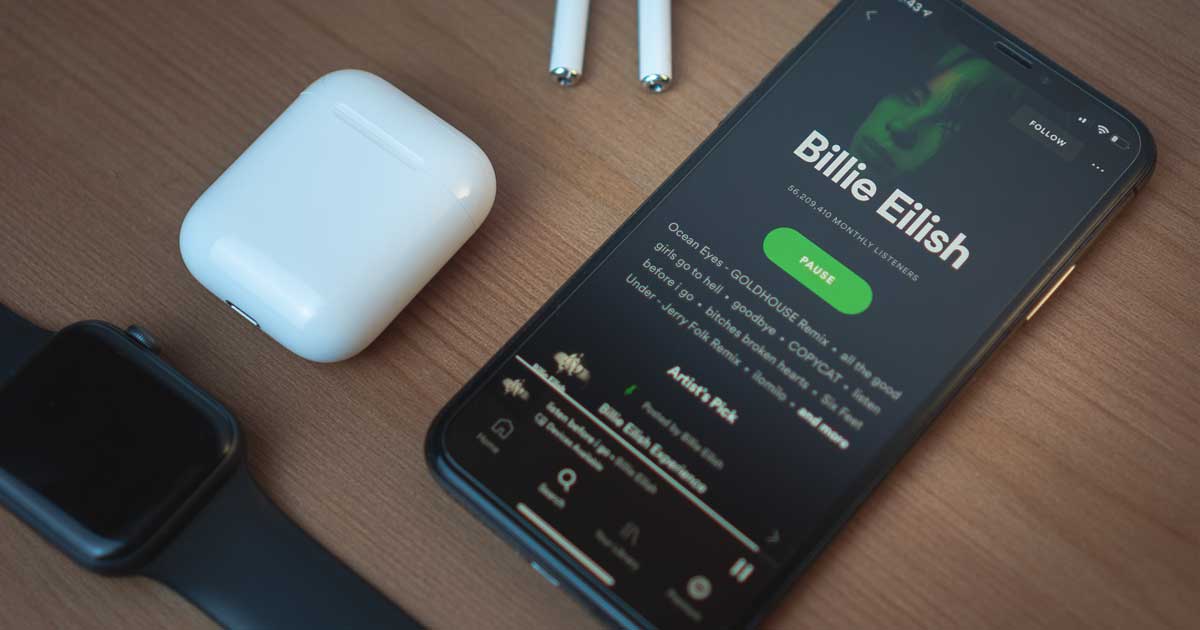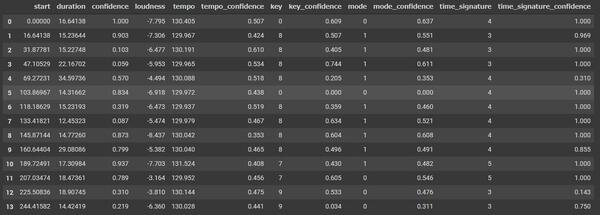
Spotify APIで楽曲の分析データを取得する方法
目次[非表示]
Spotifyのレコメンデーションは日に日に精度があがり、アルゴリズムに身を委ねる若い人々の生活になくてはならないものとなりつつあるようです。
Z世代の次の世代と言われているα世代は、こうした最新のAIに身を委ねながら(アルゴリズムを1%も疑わず)、メタバース世界で生活していくという、まさにサイバーパンク的世界が当たり前になっていくのかもしれません。
ベートーベンと八代亜紀を一緒にレコメンドするには
今から6年前の2015年、大前研一氏があるイベントの中で「ベートーベンと八代亜紀を一緒におすすめするような音楽レコメンドAIを開発していくのが重要」ということを言っていたのがとても印象的でした。
それから早くも6年が経ち、この問題はそろそろSpotify聖帝が解決してくれそうな勢いです。
レコメンデーションの仕組み
参考までに一般的にレコメンデーションには、
- 履歴から推奨する「協調ベースフィルタリング」
- アイテムから推奨する「内容べースフィルタリング」
の二通りがあるようです。
アマゾンでは商品下にある「この商品に関連する商品」が内容ベース(類似商品)、「この商品を買った人はこんな商品も買っています」が協調ベース(いわゆるおむつとビール系)だと思われます。
Spotifyでは履歴から推奨する、協調ベースフィルタリングが基本となっていそうです(この曲とこの曲を聞いた人は、あの曲を聞く確率が高いetc)。
協調ベースフィルタリングだけでは、ベートーベンと八代亜紀を一緒に聞く人がある程度いないとレコメンドは難しいような気がします。
Spotifyではここにディープラーニング(音の周波数を画像に変換し、畳み込み画像処理を行う)と、WEB上から集めたテキスト情報を自然言語処理したものをかけ合わせているそうです(変態!)。
Spotifyでは更に独自の「プレイリスト」の存在も重要となっているようで、プレイリスト一つ一つをアイテムと捉えれば、内容べースフィルタリングとしても使えそうですし、曲単位/プレイリスト単位でつけられた”いいね”も重要な学習データの一つとなっているようです。
また自動的に生成される「Daily Mix」や「Discover Weekly」といったプレイリストも学習データとすることで、まるで魔法と言われるのような高い精度が実現できているのでしょう。
Spotyfy APIで取れるデータ
こうしたSpotifyのデータはSpotify APIから取得することができます(spotipyというライブラリを使うと簡単に取得することができます)。
取得コードの解説は長くなってしまうのでこのブログでは省きますが、試しに現在「Top 50 - Japan」1位のBTS「Butter」のデータを取得すると、下記のようなデータが取得できます。
ミリセカンド単位でデータ化している
SpotifyAPIのデータを見てまず驚くのが、duration_msという音楽の長さの単位がミリセカンドだということです。
Spotifyは全ての楽曲を1,000分の1秒単位で細かく分析しているということでしょうか(凄すぎ)。
このButterのデータでは、164.441秒で2.74分(2分44秒)ということになります。
夜に駆けるを可視化する
ここからは邦楽として「夜に駆ける」のデータを取得してみたいと思います。
分析データの取得は2種類
音声分析のデータは曲単位で取得できるaudio_features("ID")と、曲中の時系列単位で取得できるaudio_analysis("ID")の2種類があるようです。
audio_features
audio_featuresで取得できる情報は下記の項目となります。
取得できる指標 |
内容 |
acousticness |
アコースティック感(0~1)
A confidence measure from 0.0 to 1.0 of whether the track is acoustic. 1.0 represents high confidence the track is acoustic.
|
danceability |
踊れる曲かどうか(0~1)
Danceability describes how suitable a track is for dancing based on a combination of musical elements including tempo, rhythm stability, beat strength, and overall regularity. A value of 0.0 is least danceable and 1.0 is most danceable.
|
duration_ms |
秒数(ms)
The duration of the track in milliseconds.
|
energy |
エネルギッシュさ(0~1)
Energy is a measure from 0.0 to 1.0 and represents a perceptual measure of intensity and activity. Typically, energetic tracks feel fast, loud, and noisy. For example, death metal has high energy, while a Bach prelude scores low on the scale. Perceptual features contributing to this attribute include dynamic range, perceived loudness, timbre, onset rate, and general entropy.
|
instrumentalness |
インスト感(歌声が入っていない/0~1)
Predicts whether a track contains no vocals. “Ooh” and “aah” sounds are treated as instrumental in this context. Rap or spoken word tracks are clearly “vocal”. The closer the instrumentalness value is to 1.0, the greater likelihood the track contains no vocal content. Values above 0.5 are intended to represent instrumental tracks, but confidence is higher as the value approaches 1.0. |
liveness |
ライブ感(聴衆がいるか)(0~1/0.8以上でライブ判定)
Detects the presence of an audience in the recording. Higher liveness values represent an increased probability that the track was performed live. A value above 0.8 provides strong likelihood that the track is live.
|
loudness |
ラウドネス/音量・音圧(dB/-60~0db)
The overall loudness of a track in decibels (dB). Loudness values are averaged across the entire track and are useful for comparing relative loudness of tracks. Loudness is the quality of a sound that is the primary psychological correlate of physical strength (amplitude). Values typical range between -60 and 0 db.
|
mode |
マイナーコード(0)/メジャーコード(1)
Mode indicates the modality (major or minor) of a track, the type of scale from which its melodic content is derived. Major is represented by 1 and minor is 0.
|
speechiness |
言葉がどれくらい入っているか(0~1)
Speechiness detects the presence of spoken words in a track. The more exclusively speech-like the recording (e.g. talk show, audio book, poetry), the closer to 1.0 the attribute value. Values above 0.66 describe tracks that are probably made entirely of spoken words. Values between 0.33 and 0.66 describe tracks that may contain both music and speech, either in sections or layered, including such cases as rap music. Values below 0.33 most likely represent music and other non-speech-like tracks.
|
tempo |
テンポ(40-200bpm)
The overall estimated tempo of a track in beats per minute (BPM). In musical terminology, tempo is the speed or pace of a given piece and derives directly from the average beat duration.
|
key |
キー(0がC/0~11)
The key the track is in. Integers map to pitches using standard Pitch Class notation . E.g. 0 = C, 1 = C♯/D♭, 2 = D, and so on.
|
time_signature |
拍子(1小節あたり何拍子か)
An estimated overall time signature of a track. The time signature (meter) is a notational convention to specify how many beats are in each bar (or measure).
|
valence |
悲観的(0)~楽観的(1)
A measure from 0.0 to 1.0 describing the musical positiveness conveyed by a track. Tracks with high valence sound more positive (e.g. happy, cheerful, euphoric), while tracks with low valence sound more negative (e.g. sad, depressed, angry).
|
popularity |
相対的人気度(0~100)
The popularity of the artist. The value will be between 0 and 100, with 100 being the most popular. The artist’s popularity is calculated from the popularity of all the artist’s tracks.
|
danceability(踊りやすい曲かどうか)など、Spotify独自の指標があるのが特徴です。
こうした数値を逆引きして曲を検索するWEBアプリが↓
audio_analysis
audio_analysisは曲を時間軸で区切って分析したデータとなるようで、「'meta', 'track', 'bars', 'beats', 'sections', 'segments', 'tatums'」という軸でデータが取得できます。
取得軸 |
内容 |
bar |
小節 |
beat |
ビート |
sections |
リズムや音色の大きな変化 |
segments |
音色とハーモニーが比較的均一な一連のサウンドエンティティ |
tatums |
リズミカルなフレーズの連続する音符間の最小の時間間隔 |
sectionsで取れるもの
segmentsで取れるもの

こちらは更に10万分の1秒単位で時系列で数値化しているようです。
このaudio_analysisの項目は日本語の解説が少なく分かりづらいですが、下記に一部まとめられていました。
sectionsは曲のパートを抽出しているようで、durationを見てみるとサビや間奏などの場面で分割されていることが分かります。

各特徴量を可視化
ここからは取得した「夜に駆ける」のデータを使って可視化してみます。
夜に駆けるは、spotifyの解析によると「エネルギッシュでポジティブな割と踊れる曲」という結果となりました。
更にこちらのアプリでaudio_analysis()で取得できる時系列データを可視化したのが↓になります。

Sectionsの色を見ると、しっかりと曲の流れに合わせて色が変化していることが分かります。
これを全ての曲で行っていると考えると、Spotifyがいかに凄いことをしているかに驚きます。
TOP50 japanをダッシュボード化
せっかくなのでSpotifyのTOP50 japanデータを取ってきて、可視化できるようダッシュボードに入れてみます。※音が出るのでご注意ください
Tableauバージョン
リンクはこちら
データポータルバージョン
リンクはこちら
まとめ
Spotify APIで手に入るデータはとにかく膨大です。
音楽市場は国内だけでも2,700億円もあるそうで、特に音楽は「趣味趣向が多様」「繰り返し聞く」「何十年も覚えている」「感情を揺さぶる」「常に新曲が現れる」「(動画コンテンと異なり)他の作業と並行して聞くことが多い」といった特徴があり、データそのものとしても扱いが面白いジャンルだと思われます。
以上SpotifyのAPI解説でした。
こちらにはSpotifyAPIを活用した様々なアプリが公開されていますので、触ってみてはいかがでしょうか。
※当社ではデータ分析や広報の代行業務を行っています。ご依頼の際は、お問い合せフォームよりお気軽にお問い合せください。
▼合わせて読みたい




